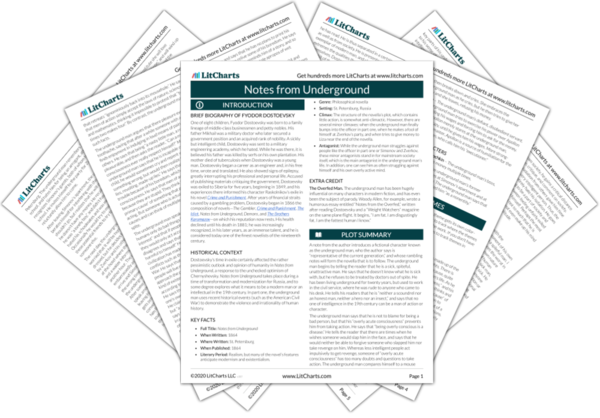Welcome to the LitCharts study guide on Fyodor Dostoevsky's Notes from Underground. Created by the original team behind SparkNotes, LitCharts are the world's best literature guides.
Notes from Underground: Introduction
A concise biography of Fyodor Dostoevsky plus historical and literary context for Notes from Underground.
Notes from Underground: Plot Summary
A quick-reference summary: Notes from Underground on a single page.
Notes from Underground: Detailed Summary & Analysis
In-depth summary and analysis of every chapter of Notes from Underground. Visual theme-tracking, too.
Notes from Underground: Themes
Explanations, analysis, and visualizations of Notes from Underground's themes.
Notes from Underground: Quotes
Notes from Underground's important quotes, sortable by theme, character, or chapter.
Notes from Underground: Characters
Description, analysis, and timelines for Notes from Underground's characters.
Notes from Underground: Symbols
Explanations of Notes from Underground's symbols, and tracking of where they appear.
Notes from Underground: Theme Wheel
An interactive data visualization of Notes from Underground's plot and themes.
Brief Biography of Fyodor Dostoevsky
One of eight children, Fyodor Dostoevsky was born to a family lineage of middle-class businessmen and petty nobles. His father Mikhail was a military doctor who later secured a government position and an acquired rank of nobility. A sickly but intelligent child, Dostoevsky was sent to a military engineering academy, which he hated. While he was there, it is believed his father was killed by serfs on his own plantation. His mother died of tuberculosis when Dostoevsky was a young man. Dostoevsky began a career as an engineer and, in his free time, wrote and translated. He also showed signs of epilepsy, greatly interrupting his professional and personal life. Accused of publishing materials critiquing the government, Dostoevsky was exiled to Siberia for five years, beginning in 1849, and his experiences there informed his character Raskolnikov’s exile in his novel Crime and Punishment. After years of financial straits caused by a gambling problem, Dostoevsky began in 1866 the composition of novels—The Gambler, Crime and Punishment, The Idiot, Notes from Underground, Demons, and The Brothers Karamazov—on which his reputation now rests. His health declined until his death in 1881; he was increasingly recognized, in his later years, as an immense talent, and he is considered today one of the finest novelists of the nineteenth century.
Get the entire Notes from Underground LitChart as a printable PDF.

Historical Context of Notes from Underground
Dostoevsky’s time in exile certainly affected the rather pessimistic outlook and opinion of humanity in Notes from Underground, a response to the unchecked optimism of Chernyshevsky. Notes from Underground takes place during a time of transformation and modernization for Russia, and to some degree explores what it means to be a modern man or an intellectual in the 19th century. In part one, the underground man uses recent historical events (such as the American Civil War) to demonstrate the violence and irrationality of human history.
Key Facts about Notes from Underground
- Full Title: Notes from Underground
- When Written: 1864
- Where Written: St. Petersburg
- When Published: 1864
- Literary Period: Realism, but many of the novel’s features anticipate modernism and existentialism.
- Genre: Philosophical novella
- Setting: St. Petersburg, Russia
- Climax: The structure of the novella’s plot, which contains little action, is somewhat anti-climactic. However, there are several minor climaxes: when the underground man finally bumps into the officer in part one, when he makes a fool of himself at Zverkov’s party, and when tries to give money to Liza near the end of the novella.
- Antagonist: While the underground man struggles against people like the officer in part one or Simonov and Zverkov, these minor antagonists stand in for mainstream society itself, which is the main antagonist in the underground man’s life. In addition, one can see him as often struggling against himself and his own overly active mind.
Extra Credit for Notes from Underground
The Overfed Man. The underground man has been hugely influential on many characters in modern fiction, and has even been the subject of parody. Woody Allen, for example, wrote a humorous essay entitled “Notes from the Overfed,” written after reading Dostoevsky and a “Weight Watchers” magazine on the same plane flight. It begins, “I am fat. I am disgustingly fat. I am the fattest human I know.”












